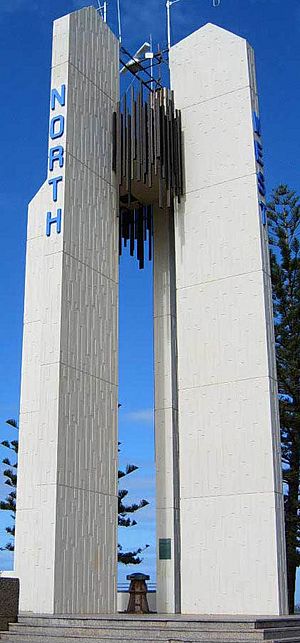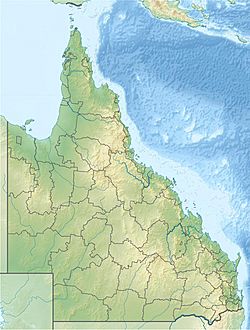Point Danger Light facts for kids
 |
|
| Point Danger Light | |
|
|
|
| Location | Point Danger Queensland Australia |
|---|---|
| Coordinates | 28°09′54.09″S 153°33′02.63″E / 28.1650250°S 153.5507306°E |
| Year first constructed | 1971 |
| Automated | 1971 |
| Construction | concrete tower |
| Tower shape | four rectangular pillars with a bronze sculpture suspended between them |
| Markings / pattern | white columns, floodlit |
| Height | 67 feet (20 m) |
| Focal height | 146 feet (45 m) |
| Range | 11 nautical miles (20 km; 13 mi) |
| Characteristic | Fl (2) W 10s. |
| Admiralty number | K2845 |
| NGA number | 111-5868 |
| ARLHS number | AUS-132 |
The Point Danger Light, also called the Captain Cook Memorial Light, is a working lighthouse in Australia. It stands on Point Danger, a piece of land sticking out into the sea. This spot is right on the border between New South Wales and Queensland. It's special because it might have been the first lighthouse ever to try using a laser as its light!
Contents
History of the Lighthouse
The Point Danger Light was built in 1971. It was the third of seven concrete lighthouses put up in Queensland between 1964 and 1979. This lighthouse was built to celebrate 200 years since Captain Cook's first journey along Australia's east coast in 1770. Its light was first turned on in April 1971.
The Laser Experiment
When it first opened, the Point Danger Light used an experimental laser as its light source. This was a very new idea for a lighthouse! It's possible it was the very first lighthouse in the world to try using a laser. However, the experiment didn't work out as planned. In 1975, the laser was replaced with a regular electric lamp.
How the Light Works Now
The light from Point Danger Light flashes two times every ten seconds. This is shown as Fl.(2)W. 10s. The light can be seen from 170° to 330° and reaches about 11 nautical miles (about 20 kilometers). Today, the light comes from an electric lamp. This lamp gets its power from a battery that is kept charged by the main electricity supply.
What the Lighthouse Looks Like
The lighthouse itself is made of four tall concrete columns. These columns are marked with the four main directions: North, South, East, and West. A bronze sculpture hangs between these columns, making the lighthouse unique.
Near the lighthouse, there's also a building for Marine Rescue NSW Point Danger station. This group helps people who are in trouble on the water.
Visiting the Point Danger Light
The light is managed by Roads and Maritime Services. You can visit the area around the lighthouse, but you cannot go inside the tower itself.
 | Lonnie Johnson |
 | Granville Woods |
 | Lewis Howard Latimer |
 | James West |


